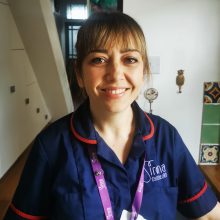
Lyndsey is a trainee advanced practitioner working within the community urgent care team. Her 15 years of experience as a nurse gave her the inspiration to be working as an advanced practitioner. Undertaking an advanced practitioner role has allowed her to develop the capability and capacity within her role in the multi-disciplinary team, providing a link between primary and secondary care. We recently took some time out to speak to Lyndsey to learn more about her role.
Lyndsey works at Level 7 across the four pillars of
advanced practice
| Clinical | – Assessing, examination, history taking, care planning and evaluation. – Providing clinical expertise to team and other members of the wider multidisciplinary team |
| Leadership | – Providing support for both clinical and non clinical members of the team – Leading on culture change projects – Creating care plans for patients |
| Education | – Educating team members – Teaching on study days – Supervision of staff |
| Research | – Audit overseer for locality – Own research to ensure up to date clinical knowledge |
Why did you want to become an advanced practitioner?
I have always enjoyed having a clinical, patient facing job that requires being ‘hands on’. My previous role was headed in a managerial direction. When an advanced practice role in the community came up, it seemed like the perfect way to stay clinical and progress my career.
What appealed most about becoming an advanced practitioner was combining learning with my clinical experience. The ability to develop the competence to work autonomously and make independent decisions to improve patient care. Being able to use my clinical judgement and expertise to make care plans and implement them is incredibly rewarding. Particularly when you can see the positive impact it has on a patient’s experience and outcomes.
How does Advanced Practice benefit patient care?
Within the urgent care setting I use my skills to ensure patients receive care in a timely manner and to prevent acute hospital admissions. Being able to assess, treat and then diagnose patient conditions in the community means that patients do not have to wait in a hospital to receive care. It’s often not an environment patients want to be in unless they really need to. I work to avoid admissions by ordering tests, prescribe and administering medication, so that we can try to keep patients where they can receive care in an environment they are comfortable with.
There are times where a hospital admission is needed. When this happens I share that decision making with the patient. I involve them in the process, so they understand what their diagnosis means. This also helps them plan the next steps that are going to happen in the short term. Forming an individualised care plan and coordinating the delivery of that plan means that the patient is kept informed and therefore has a better overall experience.
Feedback from a colleague “Advanced Practice is a great support from a medical point of view. We can consult them if a GP is not available, widening the pool for high quality advice. Advanced practitioners are there to support the team and are a big help as they make the workload lighter”
How do you see your future as an Advanced Practitioner?
Currently I am doing the research module of my AP MSc and hope to finish this within the next 2 years. I have really enjoyed working towards my masters and having protected time to study has been invaluable to my development.
After this, I can foresee that the transition to becoming a qualified Advanced Practitioner will be challenging and the learning curve is steep but worth it in the end for the reasons I have outlined above. I aim to use the non-clinical pillars of advanced practice to try and change the way work is done in my department through quality improvement projects and implementing and positive changes using my leadership skills.
I enjoy the variety of working across four pillars and addressing different aspects of care; it keeps things fresh and dynamic, which is what motivates me.
Read more advanced practice case studies from the South West region here